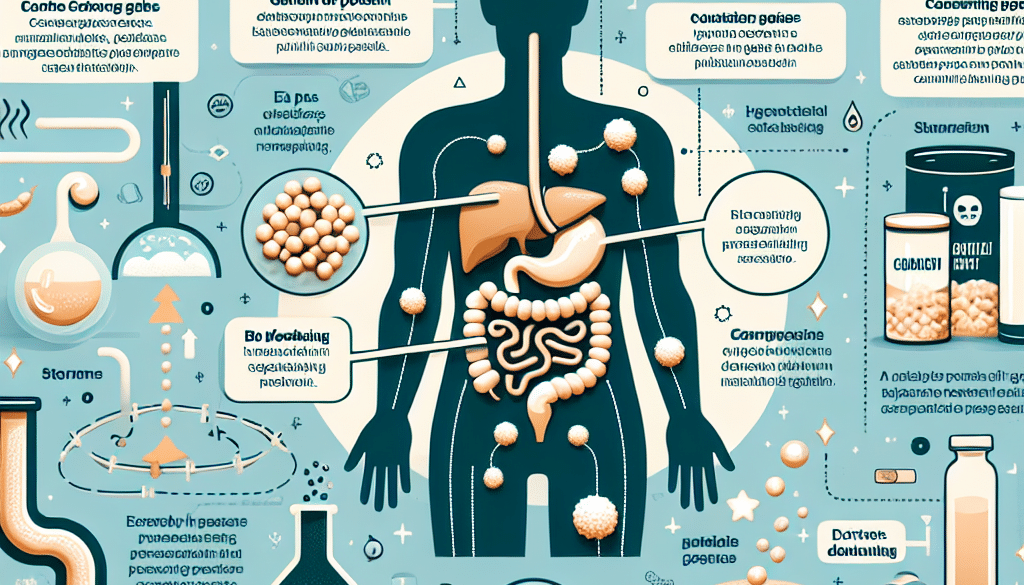Does Pea Protein Cause Gas And Bloating? The answer
Table of Contents
- Pea Protein and Digestive Health: Understanding Gas and Bloating
- What is Pea Protein?
- Can Pea Protein Cause Gas and Bloating?
- Research on Pea Protein and Digestive Discomfort
- Comparing Pea Protein to Other Protein Sources
- How to Minimize Gas and Bloating from Pea Protein
- Case Studies and Anecdotal Evidence
- Conclusion: Balancing Protein Intake and Digestive Comfort
- Discover ETprotein’s High-Quality Pea Protein Products
Pea Protein and Digestive Health: Understanding Gas and Bloating

Pea protein has become a popular plant-based alternative to animal-derived proteins, especially among vegetarians, vegans, and those with dietary restrictions. As the demand for sustainable and allergen-free protein sources grows, pea protein is often celebrated for its high protein content and amino acid profile. However, some individuals report experiencing gas and bloating after consuming pea protein. This article delves into the potential digestive issues associated with pea protein and provides insights into how to mitigate these effects.
What is Pea Protein?
Pea protein is derived from yellow split peas and is a high-quality protein that contains all nine essential amino acids. It is commonly used in protein powders, meat substitutes, and a variety of health food products. Pea protein is favored for its low allergenic potential, as it is naturally gluten-free and dairy-free, making it a suitable option for many with food sensitivities.
Can Pea Protein Cause Gas and Bloating?
While pea protein is generally well-tolerated, some individuals may experience digestive discomfort, including gas and bloating. This can be attributed to several factors:
- Fiber Content: Peas are a good source of dietary fiber. While fiber is beneficial for digestive health, a sudden increase in fiber intake can lead to gas and bloating as the body adjusts.
- Anti-Nutrients: Like many legumes, peas contain anti-nutrients such as lectins and phytic acid, which can interfere with the absorption of minerals and may cause digestive issues for some people.
- Individual Sensitivities: Each person’s digestive system is unique, and some may have sensitivities to components in pea protein that others do not.
Research on Pea Protein and Digestive Discomfort
Studies on pea protein’s impact on digestion are limited, but existing research suggests that while pea protein can cause gas and bloating in some individuals, it is generally well-tolerated. A study published in the Journal of Nutrition found that pea protein was as digestible as whey protein, indicating that it is unlikely to cause significant digestive issues for most people.
Comparing Pea Protein to Other Protein Sources
When compared to other protein sources, pea protein may actually cause less digestive discomfort for some individuals. For example, dairy-based proteins like whey and casein can lead to gas and bloating in those with lactose intolerance. Similarly, soy protein can cause issues for those with soy allergies or sensitivities. Pea protein, being hypoallergenic, often serves as a more digestible alternative.
How to Minimize Gas and Bloating from Pea Protein
If you find that pea protein causes gas and bloating, consider the following tips to minimize discomfort:
- Gradually Increase Intake: Slowly incorporate pea protein into your diet to allow your digestive system to adjust to the increased fiber content.
- Stay Hydrated: Drinking plenty of water can help facilitate digestion and reduce bloating.
- Combine with Digestive Enzymes: Taking a digestive enzyme supplement with meals can help break down anti-nutrients and improve digestion.
- Choose High-Quality Pea Protein: Opt for pea protein products that have been processed to reduce anti-nutrient content and enhance digestibility.
Case Studies and Anecdotal Evidence
While scientific research is still evolving, anecdotal evidence from consumers and nutritionists suggests that pea protein can be a part of a healthy diet without causing excessive gas and bloating. Many report that after an initial adjustment period, their bodies adapt to pea protein without any significant digestive issues.
Conclusion: Balancing Protein Intake and Digestive Comfort
In conclusion, while pea protein can cause gas and bloating in some individuals, it is generally well-tolerated and can be a valuable part of a balanced diet. By understanding the potential causes of digestive discomfort and implementing strategies to minimize these effects, consumers can enjoy the benefits of pea protein without undue distress.
Discover ETprotein’s High-Quality Pea Protein Products
If you’re looking for a reliable source of pea protein, consider ETprotein’s range of protein products. Their pea protein is characterized by a neutral taste, non-GMO, and allergen-free attributes, making it an excellent choice for those seeking a digestible and sustainable protein source.
About ETprotein:
ETprotein, a reputable protein and L-(+)-Ergothioneine (EGT) Chinese factory manufacturer and supplier, is renowned for producing, stocking, exporting, and delivering the highest quality organic bulk vegan proteins and L-(+)-Ergothioneine. They include Organic rice protein, clear rice protein, pea protein, clear pea protein, watermelon seed protein, pumpkin seed protein, sunflower seed protein, mung bean protein, peanut protein, and L-(+)-Ergothioneine EGT Pharmaceutical grade, L-(+)-Ergothioneine EGT food grade, L-(+)-Ergothioneine EGT cosmetic grade, L-(+)-Ergothioneine EGT reference grade and L-(+)-Ergothioneine EGT standard. Their offerings, characterized by a neutral taste, non-GMO, allergen-free attributes, with L-(+)-Ergothioneine purity over 98%, 99%, cater to a diverse range of industries. They serve nutraceutical, pharmaceutical, cosmeceutical, veterinary, as well as food and beverage finished product distributors, traders, and manufacturers across Europe, USA, Canada, Australia, Thailand, Japan, Korea, Brazil, and Chile, among others.
ETprotein specialization includes exporting and delivering tailor-made protein powder and finished nutritional supplements. Their extensive product range covers sectors like Food and Beverage, Sports Nutrition, Weight Management, Dietary Supplements, Health and Wellness Products, and Infant Formula, ensuring comprehensive solutions to meet all your protein needs.
As a trusted company by leading global food and beverage brands and Fortune 500 companies, ETprotein reinforces China’s reputation in the global arena. For more information or to sample their products, please contact them and email sales(at)ETprotein.com today.












